Consultation
Our team of dentists will conduct a comprehensive examination of your teeth to assess whether a root canal is necessary. This examination will involve X-rays and a pulp vitality test to accurately determine the extent of the infection.

Let’s start by taking a look at the structure of a tooth. A tooth has three layers, consisting of the outer enamel, the middle layers of dentin and cementum, and the inner pulp. The pulp holds nerves and blood vessels that nourish the tooth and is shielded by thick layers of dentin and enamel.
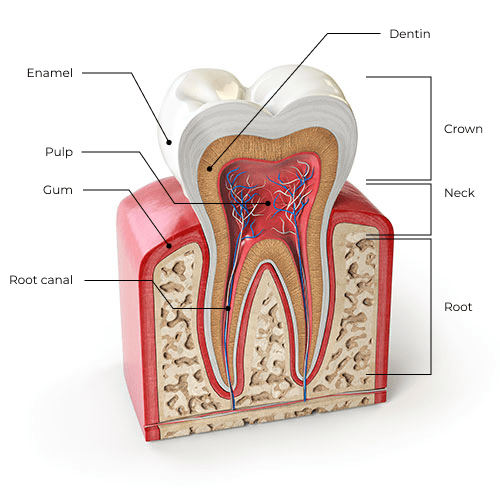
Root canal therapy is needed when the pulp becomes inflamed or infected as a result of:
Failure to address these issues may result in pain or the development of an abscess/swelling. If the inflammation isn’t treated early or is severe, the pulp damage can’t be reversed, and the tooth might have to be removed. Removing the tooth results in other problems such as chewing and speech difficulties. It also increases the risk of decay and gum disease.
Think of a root canal as a dental procedure aimed at saving your natural tooth instead of removing it. During the procedure, the dentist removes the infected pulp, cleans the root canal, and fills it. This helps you keep your natural tooth without needing to remove it. Sometimes, a crown might be needed afterward to strengthen the tooth.

Traditional root canal treament is the most common type of root canal treatment. The procedure involves the removal of infected pulp (nerve tissue) from the tooth, followed by thorough cleaning and disinfection of the canals. Subsequently, the canals are filled with a special material to prevent any further infection. This treatment is effective for most cases.

Non-surgical root canal is similar to traditional root canal, but often completed in a single session. It utilises advanced techniques such as lasers or ultrasonic tools to effectively clean and disinfect the canals. It is also less invasive.

Regenerative root canal treatment aims to stimulate the regeneration of the damaged pulp tissue instead of removing it. It has the potential to preserve more tooth structure.

Our team of dentists will conduct a comprehensive examination of your teeth to assess whether a root canal is necessary. This examination will involve X-rays and a pulp vitality test to accurately determine the extent of the infection.
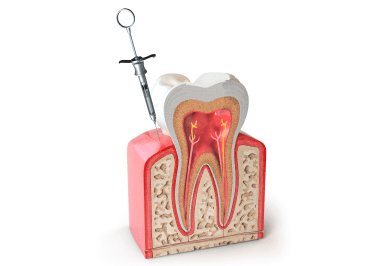
Before the root canal treatment begins, the dentist will apply local anaesthetic to numb the tooth completely. This ensures you won’t feel any pain during the procedure.
1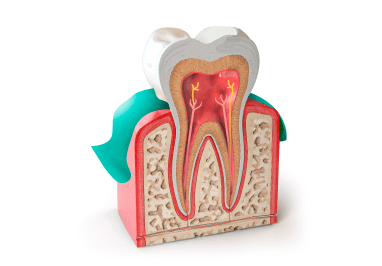
To ensure a clean and safe procedure, your dentist will place a special sheet called a dental dam around the tooth. This soft, stretchy material acts as a barrier, isolating the tooth and protects your mouth from any chemicals used during the treatment.
2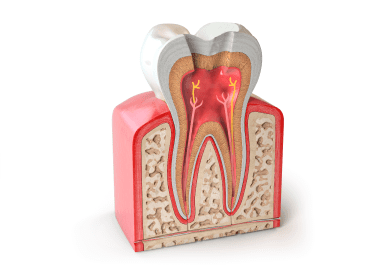
To treat the infected pulp, a small opening will be made on the top of your tooth to access the pulp chamber.
3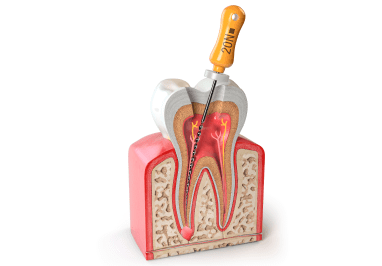
The extraction of pulp is carried out with rotary instruments under the aid of a surgical microscope during the procedure. The dentist then uses disinfecting fluids to eliminate any bacterial presence as well as to flush out any debris in the pulp.
4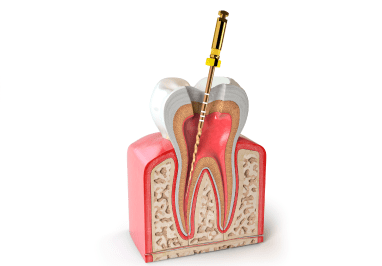
Subsequently, the dentist will then extract the infected tissue from within the tooth with the aid of root canal files. Upon complete removal of infected materials from the tooth, the dentist will conduct a thorough examination to ascertain that the tooth is in optimal condition for sealing.
5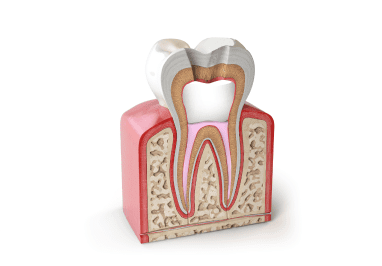
A temporary filling will be inserted in the tooth until the dental crown, inlay, or onlay is prepared for placement. The use of a temporary filling is a standard practice in dentistry and ensures that the tooth remains protected and functional until the permanent restoration is applied.
6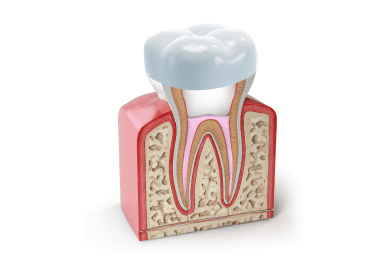
After the completion of the root canal, the dentist will take impressions of your teeth which are used for the fabrication of your custom dental crown. Once your dental crown is ready, a small supporting post may be inserted by the dentist into the tooth to enhance the stability of the permanent crown.
7
After undergoing a root canal treatment, it is common to feel soreness in the jaw area. Typically, it takes around one week for patients to recover.


The cost of a root canal treatment varies based on the tooth type, root anatomy, and the extent of the remaining tooth structure. Molars typically have multiple roots and root canals, making treatment more complex.
Another thing to consider is how much healthy tooth is left. If there’s a lot of damage or the tooth structure is lost, your dentist might need to do more work to fix it. This could involve a bigger filling, a post inside the tooth, and sometimes a dental crown after your root canal treatment is finished.
Patients with CHAS, Pioneer Generation, or Merdeka Generation Cards are eligible for denture subsidies at CHAS participating clinics.
| Dental Services | Claim Limits | Subsidy Amount (Up to $) | |||
| CHAS Orange | CHAS Blue | Merdeka Generation | Pioneer Generation |
||
| Root Canal Treatment (Anterior) | Up to 2 root canal treatments per calendar year (shared across all types of root canal treatment). | $ 217.50 | $ 326.00 | $ 331.00 | $ 336.00 |
| Root Canal Treatment (Premolar) | $ 308.50 | $ 462.50 | $ 467.50 | $ 472.50 | |
| Root Canal Treatment (Molar) | $ 389.50 | $ 584.50 | $ 589.50 | $ 594.50 | |
| Permanent Crown | Up to 4 permanent crowns per calendar year. | $ 410.00 | $ 615.00 | $ 620.00 | $ 625.00 |






Here are a few precautions you should take after a root canal procedure:
- Avoid eating until the numbness has completely worn off
- Stick to consuming soft foods and avoid biting hard objects with the treated tooth to minimize the risk of fracture
- Continue to practise good oral hygiene with gentle brushing and flossing around the treated tooth
- After the treatment, you may feel some discomfort during the first few days. Follow your dentist's instructions for any prescribed antibiotics or pain medications
A root canal treatment on a single-rooted tooth (such as a front tooth) can usually be completed in one appointment, lasting about 60 to 90 minutes.
For more complex cases, such as a molar tooth with multiple roots or severe infections, the treatment might take two or more visits.
Your dentist will administer local anesthesia to numb the area so you won't feel any pain during the procedure. You may experience some pressure or mild discomfort, but it should be manageable. You will feel some soreness or mild discomfort for a few days after the treatment. Prescribed pain medications will also help alleviate this discomfort.
The success rate of root canal treatment is as high as 85% to 95% depending on factors such as the extent of the infection, the overall condition of the tooth, and restoration and maintenance following the treatment.
A crown is recommended after a root canal treatment to protect and restore the tooth. This is due to the tooth becoming more fragile and prone to fractures after root canal treatment. A crown provides added strength and protection, restoring the functionality of the tooth, allowing proper chewing and biting.
When deciding between root canal treatment and a tooth extraction, it's important to consider several factors.
Root canal treatment offers several advantages:
- Preserves your natural tooth, which helps maintain your bite and jaw alignment. This allows you to continue using the tooth for chewing and speaking
- Helps maintain your natural appearance and smile, as there is no visible gap
- By saving the tooth, root canal treatment avoids the need for a dental implant, bridge, or denture to fill the gap left by an extraction
Some considerations for root canal treatment include:
- A root canal procedure is a comprehensive treatment that may necessitate multiple visits, particularly if the tooth has multiple roots or a serious infection
- While it may involve a higher upfront cost compared to an extraction, it can ultimately prevent the need for future replacements, thus potentially saving money in the long run
Some advantages of extraction include:
- Immediate relief of issues with damaged and infected teeth
- Quick and simpler procedure
- Less expensive
Some considerations of extraction include:
- Additional cost is required to replace the extracted tooth with an implant, bridge, or denture to preserve function and prevent neighbouring teeth from shifting
- May result in jawbone loss over time, impacting facial structure and oral health
It is generally recommend to save a natural tooth with root canal treatment whenever possible. Book an appointment with our dentist to explore your options after consultation.
When a tooth is extracted and not replaced, several issues can arise over time. The space left by the extracted tooth can cause adjacent teeth to shift, potentially leading to misalignment and bite issues. The jawbone in that area can start to deteriorate if it doesn't receive enough stimulation. This deterioration can lead to bone loss and may impact the facial structure, potentially resulting in a sunken appearance.
Missing teeth can also make chewing more difficult and speech may be affected. Additionally, the gap can trap food and bacteria, which can lead to an increased risk of gum disease and cavities in neighbouring teeth.
Saving your natural tooth with root canal treatment can help to prevent these dental issues. Additionally, opting for root canal treatment is often more cost-effective than getting a replacement tooth (implant / bridge / denture) and is also less invasive.
When the dental pulp is injured, it can cause significant pain and sensitivity, as well as inflammation and infection. If left untreated, this can lead to the death of the pulp, resulting in chronic infection, abscess formation, and tooth discoloration.
It's important to remove inflamed or infected pulp to alleviate pain, halt the spread of infection, and preserve the tooth from additional decay or extraction.
Removing the damaged pulp not only allows for thorough cleaning and sealing of the tooth but also helps prevent complications such as abscesses and bone loss. This process ultimately preserves the tooth's function and promotes its overall health.
Dental crowns can be made from various materials, including:
- Porcelain for a natural look
- Ceramic for a natural look and durability
- Metal (such as gold or platinum) for strength and durability
- Metal-ceramic (porcelain-fused-to-metal) for a combination of durability and appearance
- Resin for a cost-effective temporary solution.
The material chosen depends on various factors such as the tooth's position, function, and aesthetic needs.
With proper care, a dental crown can last for 10 to 15 years, and potentially even longer. The longevity of the crown depends on the material used, the position of the tooth and oral hygiene practices. Prioritising good oral hygiene and avoiding habits like grinding or chewing hard objects help to extend the lifespan of the restored tooth.
The cost of a root canal treatment can vary, generally ranging from S$450 to S$1,400 based on the complexity of the procedure. This does not cover any additional fees for dental crowns.
Please check out our prices here.
When undergoing a root canal treatment, you may need to schedule one or two visits. In cases with no complications, the procedure can be completed in a single visit lasting about 60 to 90 minutes.
In cases where the tooth has multiple roots, a severe infection, or other complications, the treatment may require several visits. During the first appointment, the focus will be on cleaning and shaping the root canals. If needed, the subsequent visit will concentrate on filling and sealing the canals. Our dentist will personalize a treatment plan tailored to your case.
Unfortunately, root canal treatment is not covered by Medisave with the exception of periradicular surgery.
Yes, CHAS subsidies are available for root canal treatment subject to the prevailing CHAS guidelines and rules. Please check out our CHAS subsidy table here.
Yes, alternatives to root canal therapy include:
- Tooth extraction, followed by replacement with a dental implant, bridge, or denture
- Pulp capping for minor pulp damage
- Endodontic retreatment
- Endodontic surgery (apicoectomy) for persistent issues
The most suitable alternative treatment depends on the tooth's condition. Book an appointment with our endodontist (root canal specialist) to determine the most suitable treatment.
Yes, root canal treatment can be performed on both children and pregnant women.
For children, the procedure may be necessary to save a primary (baby) tooth or a permanent tooth. In some cases, partial root canal treatment may be performed on primary teeth.
If you are pregnant, you can still go for dental treatment although invasive procedures are best avoided in the first 3 months and last 3 months of pregnancy. The doctor will be able to advise you.
Yes, a tooth that has undergone root canal treatment can become reinfected. This may occur due to new cavities or a damaged filling or crown. In the event of reinfection, it may be necessary to consider retreatment or endodontic surgery as options. By consistently prioritizing good oral hygiene and attending regular dental check-ups, you can take proactive steps to prevent reinfection.
Here is what you can do to protect a temporary filling after root canal treatment:
- Avoid hard or sticky foods
- Chew on the opposite side of your mouth where possible
- Maintain oral hygiene with gentle brushing and flossing around the area
Monitor for any signs of discomfort or damage, and be sure to contact your dentist immediately should any problems arise.
Yes, tenderness in the tooth and surrounding areas after root canal treatment is normal and typically goes away within a few days. Prescribed pain medications can also help manage discomfort. Do reach out to your dentist if the tenderness continues, intensifies, or is accompanied by severe pain or swelling.
